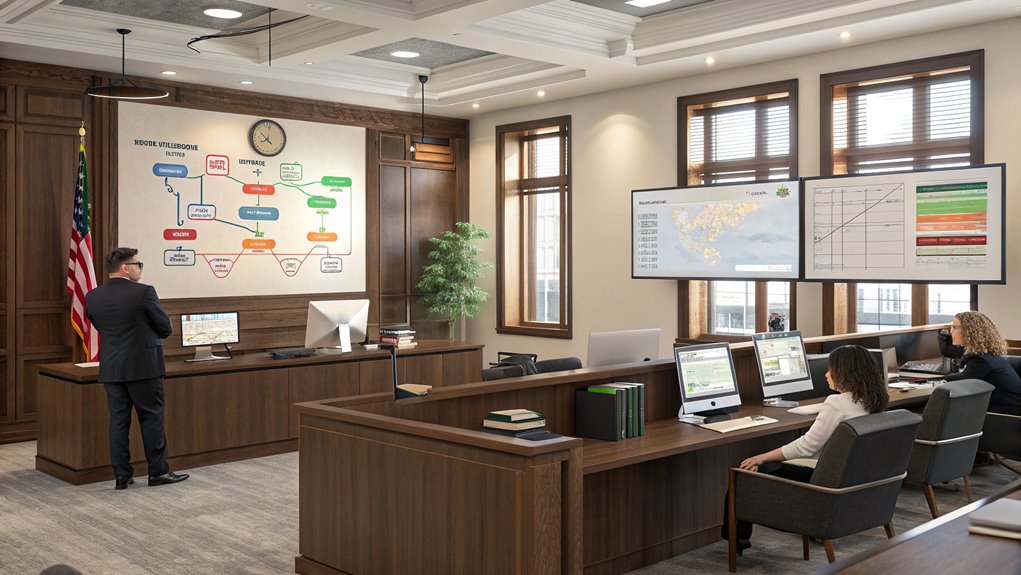Quick Take: Legal intake specialists in 2025 must continuously update their skills to effectively leverage advanced AI technologies, comply with evolving data privacy laws, and excel in complex client communications.
In today’s evolving legal landscape, intake specialists must adapt to AI-powered case management tools that streamline workflows while meeting strict regulations like GDPR and HIPAA. Success requires both technical proficiency—cloud-native platforms, encryption, and API integrations—and a strong grasp of ethics and client confidentiality.
This guide explores how continuous learning helps intake specialists stay ahead of legal tech trends and cybersecurity risks. By combining advanced communication with technical expertise, they can deliver seamless client experiences and grow from entry-level roles to leadership positions. In modern law firms, staying current is not just beneficial but essential.
Technology Integration Requirements for Modern Legal Intake Systems
Key Insight: Modern legal intake demands mastering AI-driven tools and secure cloud platforms to streamline client onboarding with precision and speed. Many modern intake services provide 24/7/365 coverage to ensure no client contact is missed.
As a result of increasing case complexity and multi-channel communications, legal intake specialists must leverage advanced AI technologies like natural language processing to efficiently capture and categorize client requests. Integrating intelligent triage systems transforms intake workflows by prioritizing inquiries and routing them according to nuanced criteria, thus optimizing resource allocation and client satisfaction. These innovations reduce human error while enhancing the speed and accuracy of initial client assessments.
Cloud-based case management solutions offer scalable, secure environments that facilitate real-time collaboration among legal teams and intake personnel. Firms often boost local visibility by managing their Google Business Profile to complement intake systems. That’s why expertise in encryption protocols, access controls, and data privacy compliance is essential to protect sensitive client information throughout the intake lifecycle. Continuous upskilling on unified platform management and API interoperability ensures seamless data exchange across specialized legal software, empowering intake specialists to maintain operational excellence in a rapidly evolving technological landscape.
For effective technology integration, legal intake specialists should focus on:
- Mastering AI-powered natural language processing tools that parse and classify client communications from emails, chats, and voice inputs
- Utilizing intelligent triage algorithms to evaluate request urgency and complexity, enabling precise prioritization and workflow automation
- Implementing cloud-native case management platforms with robust security features like end-to-end encryption and multi-factor authentication
- Ensuring compliance with GDPR, HIPAA, and other data privacy standards through permission-based access and audit trails
- Developing proficiency in API integrations to enable smooth interoperability between CRM, document management, and billing systems
- Embracing continuous learning initiatives to stay current with emerging legal tech trends and cybersecurity best practices
Embracing AI-first intake solutions fosters a proactive mindset that views technology as an indispensable partner rather than a mere tool. Legal intake professionals who adapt to these innovations become strategic assets, enhancing firm efficiency and client trust simultaneously. In moving forward, firms should prioritize comprehensive training and iterative technology assessments to sustain competitive advantage in client intake and beyond.
Additionally, intake teams should align workflows with documented HIPAA compliance protocols and reporting to safeguard client data and meet regulatory requirements.
Ethical and Regulatory Compliance Standards in Client Communication
Key Insight: Legal intake specialists must expertly balance technological skills with strict adherence to ethical and regulatory standards to safeguard client confidentiality and uphold attorney-client privilege from the very first interaction.
Legal intake operations demand more than just technical proficiency; they require a deep understanding of the complex ethical frameworks that govern client communication. Our team also coordinates with secure case management systems to maintain data integrity. As a result, specialists undergo rigorous training to protect sensitive information and ensure that every preliminary conversation aligns with professional responsibility rules. This focus on confidentiality and privilege is essential to building trust and maintaining legal integrity from initial contact through case evaluation. Our CRM/CMS integrations provide automated transfer of new client data into a secure, centralized database, reinforcing compliant recordkeeping and streamlined intake workflows.
Ongoing education empowers intake professionals to proactively identify conflicts of interest by cross-referencing client data with existing records, preventing ethical breaches before they arise. Additionally, coordination with our 24/7/365 phone coverage and overflow support helps enforce consistent intake standards through call routing. These practices evolve into robust compliance systems that include secure documentation protocols and regular audits, reinforcing the boundary between information gathering and unauthorized legal advice. That’s why continuous development in ethics and regulatory standards is critical for sustaining professional excellence.
To consistently uphold ethical and regulatory compliance, legal intake specialists implement key practices such as:
- Maintaining strict attorney-client privilege during all forms of communication, including initial screenings
- Enforcing confidentiality protocols with encrypted data storage and limited access controls
- Conducting thorough conflict-of-interest checks using comprehensive database reviews
- Adhering to documentation standards that support legal audit readiness and regulatory transparency
- Engaging in continuous professional development focused on distinguishing fact-finding from legal counsel
- Performing regular compliance audits to identify and remediate procedural vulnerabilities
Mastering these ethical and regulatory responsibilities cultivates a culture of trust and accountability within legal intake teams. This proactive approach protects both clients and firms from potential legal pitfalls, ultimately enhancing the quality of client service and professional reputation. By embedding these standards into daily operations, intake specialists not only comply with evolving legal mandates but also become vital stewards of confidentiality and integrity throughout the client journey.
Career Advancement Pathways From Intake Specialist to Management
Quick Take: Intake specialists in the legal field have a clear, expanding pathway to management roles as firms prioritize leadership development, operational expertise, and client engagement skills. Many firms now pair this pathway with 24/7/365 availability in intake services to capture leads and support continuous client engagement.
As a result of the legal industry’s steady growth and evolving client demands, intake specialists are uniquely positioned to advance into management by mastering both technical and interpersonal competencies. Firms also rely on CRM/CMS integration to synchronize intake data and reduce manual entry. This progression often involves gaining proficiency in case evaluation, client communication, and team coordination, which are critical for overseeing intake operations effectively. Firms increasingly value specialists who contribute to strategic initiatives, such as streamlining workflows and enhancing client service delivery, aligning with broader organizational goals. Members of accredited centers often demonstrate standards like ATSI Gold certification, reflecting rigorous best-practice criteria.
That’s why mentorship and targeted certification programs play a pivotal role in career advancement, equipping specialists with leadership acumen and administrative insights necessary for supervisory roles. Specialists who demonstrate initiative in training colleagues and managing complex caseloads attract internal promotions, especially within large law firms that emphasize talent development from within. This career trajectory not only boosts personal growth but also supports scalable operational excellence in diverse practice areas.
Key competencies for advancing from intake specialist to management include:
- Strong client communication and crisis resolution abilities that build trust and retention
- Expertise in legal intake technology platforms and data-driven case assessment
- Leadership skills gained through mentorship programs and hands-on team oversight
- Certification in legal administration, project management, or business operations
- Proven track record in training new hires and managing caseload logistics efficiently
- Strategic thinking to develop and implement operational procedures enhancing client experience
Continuous Learning Infrastructure Through Professional Development Programs
Key Insight: Continuous learning frameworks empower legal intake specialists with advanced skills and resilience, driving career progression and operational excellence through structured, empathetic, and technology-enabled professional development.
Comprehensive professional development programs extend well beyond foundational training, embedding advanced legal knowledge, procedural expertise, and emotional intelligence critical to handling sensitive cases. These programs often integrate AI-powered booking systems to streamline workflows and improve intake accuracy. These initiatives leverage blended learning modalities—combining in-person workshops, virtual platforms, and ongoing coaching—to address diverse learner needs and evolving industry standards. This continuous learning infrastructure cultivates adaptability and proficiency, enabling specialists to navigate complex legal environments and support multidisciplinary teams effectively. These initiatives are further strengthened by continuous adaptation in AI services, which improves performance as interaction volume increases.
Sustained skill enhancement fosters a growth mindset and promotes compliance with regulatory frameworks such as HIPAA, while augmenting communication and case management capabilities. That’s why integrating specialized modules on abuse cases, mental health awareness, and legal terminology ensures well-rounded development aligned with best practices. Remote learning solutions and tailored script consultations empower geographically dispersed teams, maintaining consistent quality and operational agility in dynamic legal settings.
Crucial components of an effective continuous learning infrastructure include:
- Structured professional development programs spanning months to a year, emphasizing legal intake and case classification expertise
- Communication and mental health workshops designed to enhance collaboration and emotional resilience
- Specialized training on sensitive practice areas, including abuse cases and HIPAA compliance standards
- Flexible virtual learning platforms supporting asynchronous and synchronous engagement for remote teams
- Longitudinal coaching featuring call monitoring, monthly expert consultations, and iterative feedback loops
- Career pathway frameworks that align skill acquisition with management and specialized legal support roles
Embracing a continuous learning mindset transforms legal intake specialists into proactive contributors who drive quality assurance and operational excellence. This approach not only enhances individual capabilities but also fortifies organizational readiness amid evolving legal demands. As a result, investing in comprehensive, AI-enabled professional development is essential for sustainable career growth and delivering superior client outcomes in the legal services landscape. Providers commonly automate intake workflows by integrating training outcomes with CRM/CMS systems to improve efficiency and data consistency.
Enhanced Client Management and Communication Skills Training
Quick Take: Specialized communication training empowers legal intake specialists with advanced interpersonal skills and empathetic techniques essential for managing sensitive client interactions and optimizing conversion outcomes.
Effective client communication is fundamental to successful legal intake processes, requiring a blend of professional expertise and emotional intelligence. Targeted training programs have evolved to enhance specialists’ abilities to navigate nuanced conversations, ensuring they build trust and rapport swiftly with prospective clients facing vulnerable situations. This not only elevates client experience but also streamlines case qualification and intake efficiency.
Integrating psychology-driven interviewing and strategic call control techniques helps specialists maintain control while fostering genuine connection. Mastering legal terminology alongside polished phone etiquette ensures clarity and professionalism, regardless of the client’s familiarity with legal concepts. These comprehensive skill sets collectively transform client engagement into a seamless, empathetic process that drives higher satisfaction and conversion rates.
Enhanced training curricula focus on these critical communication competencies to optimize client intake success:
- Professional phone etiquette that consistently projects the law firm’s credibility and responsiveness
- Legal terminology proficiency to translate complex concepts into accessible language for diverse client backgrounds
- Psychology-based interviewing techniques that identify emotional cues and adapt questioning to sensitive contexts
- Call control strategies that efficiently guide conversations from initial inquiry to case commitment
- Advanced questioning methods designed to extract detailed case information while respecting client boundaries
By embracing these specialized skills, intake specialists become adept at quickly establishing trust and understanding, which is crucial for converting inquiries into retained clients. As a result, law firms benefit from improved client satisfaction and a more effective intake funnel. Please note that inquiries submitted outside business hours are responded to on the next business day, as detailed in our Hours of Operation.
Evolving Educational Requirements for Legal Industry Professionals
Key Insight: Legal intake specialists now require advanced education, specialized certifications, and technology skills to excel in today’s evolving legal landscape and meet employer expectations.
The baseline qualifications for legal intake specialists have expanded beyond basic customer service skills and high school diplomas. Employers have raised educational standards, favoring associate degrees in legal studies or communications for entry-level roles, while larger firms often mandate bachelor’s degrees to reduce onboarding time and enhance professional competency. This trend reflects the growing demand for practitioners who can navigate nuanced client interactions and regulatory frameworks with confidence.
Specialized certification programs and technological proficiency have become essential differentiators in competitive hiring markets. Certifications such as Legal Administrative Specialist and paralegal credentials empower professionals to manage complex intake processes while adhering to strict legal ethics and confidentiality requirements. That’s why community colleges and training providers offer targeted programs—ranging from several months to a year—that focus on case management software mastery and compliance standards, ensuring graduates are fully prepared for the dynamic demands of modern legal environments.
Critical qualifications for legal intake specialists now emphasize:
- Advanced education levels including associate and bachelor’s degrees tailored to legal and communication fields
- Specialized certifications such as Legal Administrative Specialist and paralegal credentials that validate expertise and ethical knowledge
- Proficiency in legal technology platforms like Clio, MyCase, and other case management systems essential for efficient client intake and document handling
- Comprehensive understanding of legal ethics, client confidentiality, and regulatory compliance vital for trustworthy client engagement
- Targeted training programs provided by community colleges designed to align educational outcomes with industry expectations and technological trends
The evolving requirements for legal intake specialists underscore a shift toward a more skilled, knowledgeable workforce equipped to handle the intricacies of modern legal practice. Higher education, certification, and technology fluency will not only enhance career prospects but also improve client satisfaction and firm efficiency. By proactively adapting to these standards, aspiring professionals can position themselves as indispensable assets in a competitive legal job market.
In Summary
In 2025, legal intake specialists face a dynamic environment where technology advancements and regulatory changes continuously reshape their responsibilities. Staying current through ongoing education enables these professionals to enhance their expertise in managing complex client interactions and ensuring compliance with evolving legal standards. This commitment to learning not only supports ethical practices but also strengthens their ability to deliver precise and effective intake services.
Continuous professional development cultivates adaptability, a crucial trait as client expectations and communication channels progress rapidly. Intake specialists who prioritize skill enhancement position themselves to contribute meaningfully within their teams and respond adeptly to emerging challenges. Moreover, a solid foundation of knowledge fosters confidence and professionalism, which clients recognize and value during initial consultations.
Alert Communications understands the importance of equipping legal intake specialists with the resources necessary for sustained growth. By focusing on comprehensive training and industry insights, we support professionals tasked with critical client engagement functions. For more information on how to advance your career in legal client intake services, visit Alert Communications’ home page to access trusted guidance and expertise.






